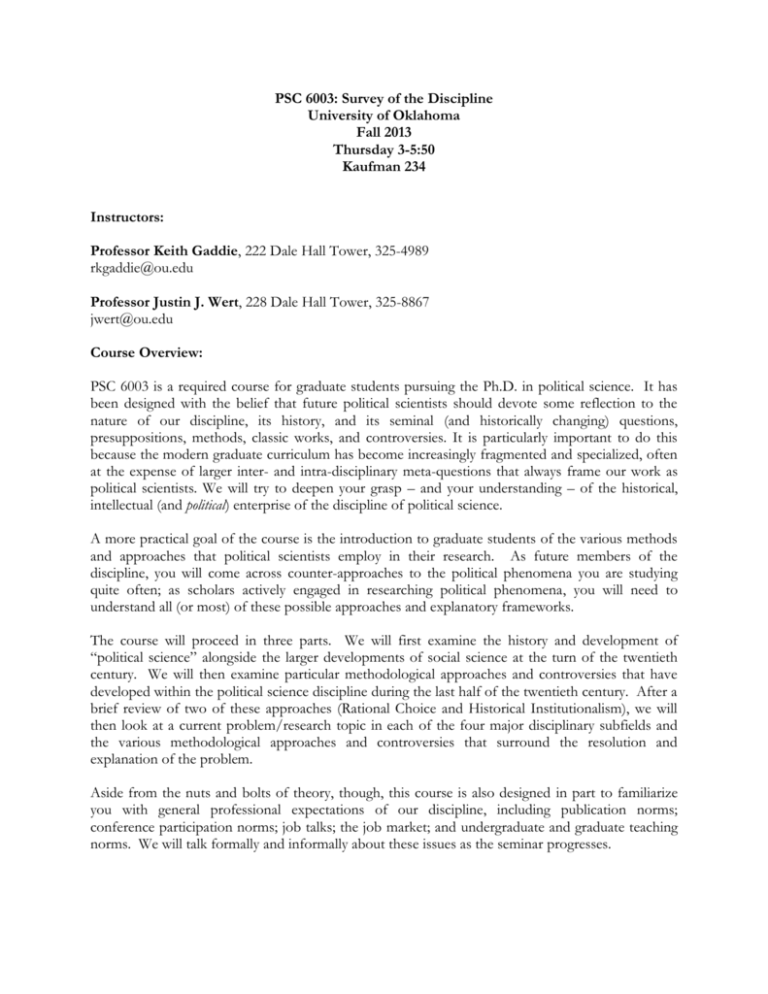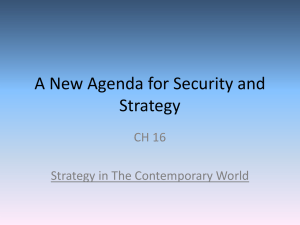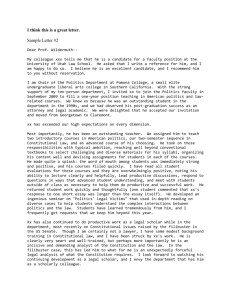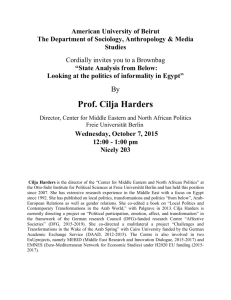PSC 6003: Survey of the Discipline University of Oklahoma Fall
advertisement

PSC 6003: Survey of the Discipline University of Oklahoma Fall 2013 Thursday 3-5:50 Kaufman 234 Instructors: Professor Keith Gaddie, 222 Dale Hall Tower, 325-4989 rkgaddie@ou.edu Professor Justin J. Wert, 228 Dale Hall Tower, 325-8867 jwert@ou.edu Course Overview: PSC 6003 is a required course for graduate students pursuing the Ph.D. in political science. It has been designed with the belief that future political scientists should devote some reflection to the nature of our discipline, its history, and its seminal (and historically changing) questions, presuppositions, methods, classic works, and controversies. It is particularly important to do this because the modern graduate curriculum has become increasingly fragmented and specialized, often at the expense of larger inter- and intra-disciplinary meta-questions that always frame our work as political scientists. We will try to deepen your grasp – and your understanding – of the historical, intellectual (and political) enterprise of the discipline of political science. A more practical goal of the course is the introduction to graduate students of the various methods and approaches that political scientists employ in their research. As future members of the discipline, you will come across counter-approaches to the political phenomena you are studying quite often; as scholars actively engaged in researching political phenomena, you will need to understand all (or most) of these possible approaches and explanatory frameworks. The course will proceed in three parts. We will first examine the history and development of “political science” alongside the larger developments of social science at the turn of the twentieth century. We will then examine particular methodological approaches and controversies that have developed within the political science discipline during the last half of the twentieth century. After a brief review of two of these approaches (Rational Choice and Historical Institutionalism), we will then look at a current problem/research topic in each of the four major disciplinary subfields and the various methodological approaches and controversies that surround the resolution and explanation of the problem. Aside from the nuts and bolts of theory, though, this course is also designed in part to familiarize you with general professional expectations of our discipline, including publication norms; conference participation norms; job talks; the job market; and undergraduate and graduate teaching norms. We will talk formally and informally about these issues as the seminar progresses. Assignments and Grading: 1. Weekly “reaction” papers, summarizing and critiquing the week’s topic(s) and readings. The papers are to be 1-2 pages in length. They are to be e-mailed to Professors Gaddie AND Wert no later than midnight on the Wednesday before our Thursday class. The papers are worth 10% of your final grade. 2. Each student is to help “lead” one seminar. This entails raising a set of questions and orienting our discussion for the week’s topic, as well as summarizing and critiquing the week’s readings (and one or two recommended readings) in a semi-formal paper (appx. 8-10 pages) that will be distributed to the entire seminar. 30% 3. A seminar paper on any topic related to the course. Ideally, this paper will examine the methodological “terrain” of a topic germane to your own graduate research. Professors Gaddie and Wert will meet with every seminar participant individually early in the semester to help you get started with your paper. The paper is due during the week of final exams. 60%. Required Books: Aristotle, The Politics Henry E. Brady & David Collier. 2004. Rethinking Social Inquiry: Diverse Tools, Shared Standards. Lanham, MD: Rowman & Littlefield. ISBN: 074251126-X Jared Diamond and James Robinson, eds. 2010. Natural Experiments of History. Cambridge: Harvard University Press. Gary King, Robert O. Keohane, & Sidney Verba. 1994. Designing Social Inquiry: Scientific Inference in Qualitative Research. Princeton: Princeton University Press. ISBN: 0691034710 Ross, Dorothy. 1991. The Origins of American Social Science. New York: Oxford University Press. ISBN: 052142836X V.O. Key. 2006. Southern Politics in State and Nation. Knoxville: University of Tennessee Press. Gabriel Almond. 1990. A Discipline Divided: Schools and Sects in Political Science. Sage. ISBN: 0803933029 Raymond Seidelman. 1985. Disenchanted Realists: Political Science and the American Crisis, 18841984. Albany: SUNY. ISBN: 0873959957 Kristen Monroe. 2005. Perestroika! The Raucous Rebellion in Political Science Yale University Press. **Most journal articles are available on line** Accommodation: The University of Oklahoma is committed to providing reasonable accommodation for students with disabilities. Students with disabilities should speak to the instructors early in the semester, and must be registered with the Office of Disabilities prior to receiving accommodations in this course. Disabilities Services is located in Goddard Health, 325-3852. Course Schedule Week 1 (Aug. 22) Course Introduction and Overview Stephen J. Gould. 2000. “Deconstructing the ‘Science Wars’ by Reconstructing an Old Mold,” Science 287 (January 14): 253-261. Week 2 (Aug. 29) NO CLASS: APSA Week 3 (Sept. 5)Preliminaries: What is Political Science? Aristotle, The Politics, Books 1, 3,4,5, & 6 ALMOND, GABRIEL. 1990. A DISCIPLINE DIVIDED: SCHOOLS AND SECTS IN POLITICAL SCIENCE . SAGE . Week 4 (Sept. 12) The History & Construction of Social and Political Science Required: ROSS, DOROTHY. 1991. THE ORIGINS OF AMERICAN SOCIAL SCIENCE. NEW YORK: OXFORD UNIVERSITY PRESS. SEIDELMAN, RAYMOND & EDWARD J. HARPHAM. 1985. DISENCHANTED REALISTS: POLITICAL SCIENCE AND THE AMERICAN CRISIS, 1884-1984. ALBANY: STATE UNIVERSITY OF NEW YORK PRESS Recommended: Smith, Munroe. 1886. “The Domain of Political Science.” Political Science Quarterly 1:1. Willoughby, W.W. 1904. “The American Political Science Association.” Political Science Quarterly 19:107. Goodnow, Frank J. “The Work of the American Political Science Association.” The American Political Science Review Collini, Stefan, Donald Winch, and John Burrow. 1983. That Noble Science of Politics: A Study in Nineteenth-Century Intellectual History. Cambridge: Cambridge University Press. FARR, JAMES, JOHN S. DRYZEK, AND STEPHEN T. LEONARD, EDS. 1995. POLITICAL SCIENCE IN HISTORY: RESEARCH PROGRAMS AND POLITICAL TRADITIONS. NEW YORK: CAMBRIDGE UNIVERSITY PRESS. Wasby, Stephen L. 1970. Political Science -- The Discipline and its Dimensions: An Introduction. New York: Charles Scribner’s Sons. V.O. Key, Jr. 1958. “The State of the Discipline.” American Political Science Review 52:961. Adcock, Robert. 2003. “The Emergence of Political Science as a Discipline: History and the Study of Politics in America, 1875-1910.” History of Political Thought 24:481. Dryzek, John S. & Stephen T. Leonard. 1988. “History and Discipline in Political Science.” American Political Science Review 82: 1245. Kaufman-Osborn. 2006. “Dividing the Domain of Political Science: On the Fetishism of Subfields.” Polity 38: 41. Week 5 (Sept. 19) Political Science & Method(s) Required: KING, GARY, ROBERT O. KEOHANE & SIDNEY VERBA. 1994. DESIGNING SOCIAL INQUIRY: SCIENTIFIC INFERENCE IN QUALITATIVE RESEARCH. PRINCETON: PRINCETON UNIVERSITY PRESS. BRADY, HENRY E. AND DAVID COLLIER. 2004. RETHINKING SOCIAL INQUIRY: DIVERSE TOOLS, S HARED STANDARDS. LANHAM: ROWMAN & LITTLEFIELD. Recommended: MARCUS K REUZER, “HISTORICAL KNOWLEDGE AND QUANTITATIVE ANALYSIS: THE CASE OF THE ORIGINS OF PROPORTIONAL REPRESENTATION .” AMERICAN POLITICAL SCIENCE REVIEW , VOL. 104, NO. 2 (2011). NORTON, ANNE. 2004. 95 THESES ON POLITICS, CULTURE, & METHOD. NEW HAVEN: YALE UNIVERSITY PRESS . KRISTEN MONROE. 2005. PERESTROIKA ! THE R AUCOUS REBELLION IN POLITICAL SCIENCE. NEW HAVEN: YALE UNIVERSITY PRESS . SHAPIRO, IAN, ROGERS M. SMITH, AND TAREK E. MASOUD. 2004. PROBLEMS AND METHODS IN THE STUDY OF POLITICS. NEW YORK: CAMBRIDGE UNIVERSITY PRESS. Smith, Rogers M. 2004. “Identities, Interests, and the Future of Political Science.” Perspectives on Politics 2: 301. Cohn, Jonathan. 1999. “Irrational Exuberance: When Did Political Science Forget about Politics?” The New Republic, Oct. 25, 25-32. Week 6 (Sept. 26) Roundtable: Publishing in Political Science Journals Keith Gaddie Hank Jenkins-Smith Week 7 (Oct. 3) What Historians and Economists Think About Political Science (and political scientists) David Chappelle (History) Kevin Grier (Economics) Week 8 (Oct. 10) Rational Choice Required: Moe, Terry. 2005. “Power and Political Institutions.” Perspectives on Politics 3: 218. Ostrom, Elinor. 1998. “A Behavioral Approach to the Rational Choice Theory of Collective Action.” American Political Science Review 92: 1. Riker, William H. 1995. “The Political Psychology of Rational Choice Theory,” Political Pyschology) 16: 23. Recommended: GREEN, DONALD AND IAN SHAPIRO. 1994. THE PATHOLOGIES OF RATIONAL CHOICE: A CRITIQUE OF APPLICATIONS IN POLITICAL SCIENCE. NEW HAVEN: YALE UNIVERSITY PRESS. Cox, Gary. 1999. “The Empirical Content of Rational Choice Theory: A Reply to Green and Shapiro.” Journal of Theoretical Politics. 11: 147. Riker, William H. and William Zavoina. 1970. “Rational Behavior in Politics: Evidence from a Three Person Game.” American Political Science Review. 64: 48. Walt, Stephen M. 1999. “Rigor or Rigor Mortis? Rational Choice and Security Studies,” International Security 23: 5-48. Bueno de Mesquita & Morrow, Martin, Niou & Ordeshook, Powell, Zagare, and Walt (all in International Security 24:2 (Autumn 1999), 56-130. Week 9 (Oct. 17) Historical Institutionalism Required: March, James G. and Johan P. Olsen. 1984. “The New Institutionalism: Organizational Factors in Political Life.” American Political Science Review. 78: 734-749. Pierson, Paul. 2000. “Increasing Returns, Path Dependence, and the Study of Politics.” American Political Science Review. 94 (2): 251-267. Mahoney, James. 2004. “Comparative-Historical Methodology.” Annual Review of Sociology. 30:81-101. Orren, Karen and Stephen Skowronek. 1994. “Beyond the Iconography of Order: Notes for a ‘New Institutionalism.’” In, The Dynamics of American Politics: Approaches and Interpretations. ed. Larry C. Dodd. Boulder: Westview Press. Recommended: ORREN, KAREN AND STEPHEN S KOWRONEK. 2004. THE SEARCH FOR A MERICAN POLITICAL DEVELOPMENT . CAMBRIDGE: CAMBRIDGE UNIVERSITY PRESS . STEPHEN SKOWRONEK. 1997. THE POLITICS PRESIDENTS MAKE, HARVARD UNIVERSITY PRESS. STEPHEN SKOWRONEK. 1982. BUILDING A NEW AMERICAN STATE, CAMBRIDGE UNIVERSITY PRESS. Lusitck, Ian S. 1996. “History, Historiography, and Political Science: Multiple Historical Records and the Problem of Selection Bias.” American Political Science Review 90: 605-618. Walter Dean Burnham. 1967. “Party Systems and the Political Process,” in The American Party Systems, Chambers and Burnham, eds, Oxford University Press. Rogers Smith and Desmond King. 2005. “Racial Orders in American Political Development,” American Political Science Review 99: 75-92. Week 10 (Oct. 24) Political Theory: How to “Read” a Text Guest: Prof. Don Maletz Required: Leo Strauss, “On a Forgotten Kind of Writing” Quentin Skinner, “Meaning and Understanding in the History of Ideas,” History and Theory Vol., No. 1 (1969) Michael Oakeshott, “Introduction to Leviathan” Recommended: Gunnell, John G. 1988. “American Political Science, Liberalism, and the Invention of Political Theory.” American Political Science Review 82: 71. Gunnell, John G. 1981. “Encounters of a Third Kind: The Alienation of Theory in American Political Science.” American Journal of Political Science 25: 440. Week 11 (Oct. 31) American Politics Required: V.O. Key, Southern Politics in State and Nation Week 12 (Nov. 7) Comparative Politics Guests: Prof. Paul Goode Required: Rudra Sil and Peter Katzenstein, “Analytic Eclecticism in the Study of World Politics: Reconfiguring Problems and Mechanisms across Research Traditions.” Perspectives on Politics, Vol. 8, no. 4 (2011). J. Paul Goode, “Redefining Russia: Hybrid Regimes, Fieldwork, and Russian Politics,” forthcoming in Perspectives on Politics, December 2010 Recommended: Kathleen Thelen. 1999. “Historical Institutionalism in Comparative Politics,” Annual Review of Political Science. Ira Katznelson. 1997. “Structure and Configuration in Comparative Politics,” in Mark Irving Lichbach and Alan S. Zuckerman, Comparative Politics: Rationality, Culture, and Structure Cambridge: Cambridge University Press. Kathleen Thelen. 2003. “How Institutions Evolve: Insights from Comparative Historical Analysis,” in James Mahoney and Dietrich Rueschemeyer, eds, Comparative Historical Analysis in the Social Sciences Cambridge: Cambridge University Press. Week 13 (Nov. 14) PA/Policy Guests: Alyssa Hicklin Required: Frank Goodnow, Politics and Administration” (D2L) David L. Weimer, “Theories of and n the Policy Process,” The Policy Studies Journal, vol. 36, no. 4 (2008) [D2L] Anthony M. Bertelli and Lilliard E. Richardson, Jr., “The behavioral Impact of Drinking and Driving Laws,” The Policy Studies Journal, vol. 36, no. 4 (2008) [D2L] Week 14: (Nov. 21) International Relations Guests: Prof. Greg Russell Prof. Jonathan Monten Week 15 (Nov. 28) Thanksgiving Break Week 16 (Dec. 5) Perestroika (all) Jared Diamond and James Robinson, eds. 2010. Natural Experiments of History. Cambridge: Harvard University Press. **Seminar papers due Dec. 13 by 5:00 P.M.**









